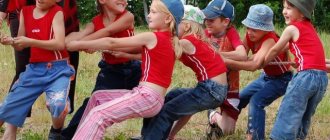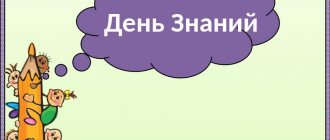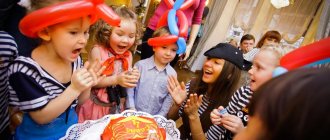There are many solemn and fun dates in the school holiday calendar. Some of them are repeated from year to year; other celebrations are celebrated only by first-graders or graduates. Let's remember the main holidays so as not to forget about anything in the bustle of everyday life. Since the school year is not equal to the calendar year, we will talk about holidays starting in September.
- 1 September is the day of knowledge
- October 5 – Teacher's Day
- Last Sunday of November – Mother's Day
- January 1 – New Year
- January 7 – Christmas
- January-February - Farewell to the ABC (ABC Book Holiday)
- February-March – Maslenitsa
- February 23 – Defender of the Fatherland Day
- March 8 – International Women's Day
- April-early May – Easter
- May 9 – Victory Day
- May 25 – Last call
- End of June – Graduation evening
Day of Knowledge
When is it celebrated?
September 1
The meaning and history of the holiday
It appeared in the state calendar in 1980, which only formalized the established tradition of treating this day with special reverence. It was then that the holiday received its familiar name – Day of Knowledge. The most common point of view about why the school year begins on September 1 is that it is a tribute to a tradition that developed a long time ago. Indeed, in the old days, most children studied in schools at churches, and the church new year began on the first day of autumn.
As celebrated in schools
It is customary to celebrate the Day of Knowledge on a grand scale, organizing long ceremonial assemblies, which then continue with class hours.
What to gift
In Russia, on September 1, teachers are given flowers. In recent years, a new tradition has emerged of presenting one bouquet to the class teacher and using the saved funds for charitable purposes. In addition, many parents congratulate their children on this day. Despite the fact that a sad joke is circulating on the Internet: “Congratulating teachers and children on September 1 is the same as congratulating a horse on the beginning of the sowing season” - for most of us, Knowledge Day is still a holiday, and difficulties begin after it. When choosing a gift for a child, do not try to buy something purely practical and useful, but rather take into account the interests and passions of the students themselves.
Article “Holidays at school”
Holidays at school.
There is a very widespread opinion that the task of the school is to provide knowledge, skills and organize activities based on what the student knows and can do. It seems to us that there is one more element whose role in school life is enormous - this is the attitude towards what you know, can and do.
What happens to knowledge? They grow: for some, quickly, for others, not so much. Skills develop: in the second grade I can do more than in the first; in the eleventh – more than in the ninth. Relationships are more difficult. It does not grow or decrease; it changes, sometimes changing quickly and unpredictably. The delight and joyful shock that you experienced today may go away tomorrow, and everything will become familiar, expected, normal. Feelings of predictability will be followed by indifference, then irritation, and, if you imagine the worst, then disgust. However, such a series is not at all natural: any state can turn out to be a turning point, and indifference will again become first interest, and then delight.
In group psychology and sociology, there are theories that claim that changes in relationships and their cyclical nature are natural and that this phenomenon can be taken into account rather than influenced. Many accept this point of view only partially, arguing that it is possible to influence attitudes at school. Moreover: on the very idea of such targeted influence - creating the “enthusiastic-fantastic” from the “normal-ordinary” - one can build a cycle of school holidays. Life, as we know, consists of events and attitudes towards these events. Therefore, it is necessary that Events appear in school life that would bring joy to their participants “here and now” and give hope that this joy will be repeated.
Holidays are different... Traditional and unexpected, national and family, adults and children. Any holiday can be an amazing event or a boring event. It may turn out to be or turns out to be because...? Someone will say: what explanations can there be? A holiday is a state of mind, a unit of Happiness, and if we design or analyze it, it will disappear and turn into a methodical set of “celebratory events.” We can only partially agree with this. Yes, any holiday is undoubtedly a “state of mind.” But this state does not arise out of nothing; it is always associated with our activities and events. We expect them, these events, we prepare for them, we participate in them, and then we remember (with joy, regret, and maybe shame) about what happened.
The holiday, along with the game, is one of the oldest phenomena of human social life, part of universal human culture. The need for a holiday is a person’s need to share the “joys of life” with others. The transformation of joy from “one’s own” into “common” creates a holiday, multiplies the joyful empathy of others (or at least another), makes it common.
Being a complex phenomenon, any holiday consists of many components:
— stable elements (participants, occasion, topic),
-formative elements-symbols (Christmas tree, cake, candles, etc.),
-new author’s elements related to both the content and organization of the holiday.
The theme of the holiday determines the content of what happens at it. Choosing the right occasion is often the key to the success of the holiday.
When inventing, organizing and holding a holiday, it makes sense to rely on stable elements that can become the basis for the form of festive action:
-ceremonial, theatricalization, improvisation, etc.
In discussions about the holiday, the key word is the word “joy.” It seems that an ideal, “fulfilled” holiday always unites with a common joy those who are related to it (at the level of organization, participation, spectator empathy, although these roles are sometimes impossible to separate). Moreover, this joy is, as it were, end-to-end: we expect it, experience it, remember it.
A holiday at school is about creating an emotionally attractive school environment. The habitat in our case is school. We must change the weather, we must take upon ourselves the courage to define a world in which it is comfortable to live and interesting to learn how to create.
Primary school teacher
GBOU secondary school No. 516
Ivanova Polina Leonidovna
Teacher's Day
When is it celebrated?
October 5
The meaning and history of the holiday
Teacher's Day was established on September 29, 1965. Until the early nineties, it was celebrated on the first Sunday in October. But since 1994, World Teachers' Day has appeared on the holiday calendar of more than a hundred countries - October 5th. The date was not chosen by chance: it was on this day in 1966 that the Special Intergovernmental Conference on the Status of Teachers was held in Paris. Russia also became one of the countries that celebrates Teacher’s Day on October 5, especially since we didn’t have to change practically anything: our holiday still falls at the very beginning of October.
As celebrated in schools
In schools, Teacher's Day is usually celebrated on a grand scale. Concerts, Days of Self-Government, various competitions - all this is traditionally included in the festive program. And since 1995, it is on this day that the most distinguished teachers are awarded, giving them the honorary title of Honored Teacher of the Russian Federation.
What to gift
Children and parents can also congratulate their favorite teachers. Not only flowers are always appropriate, but also tea, coffee, fruit or candy bouquets.
Mothers Day
When is it celebrated?
On the last Sunday of November
The meaning and history of the holiday
One of the newest holidays in our country, which, nevertheless, through the efforts of kindergarten teachers, school teachers, representatives of public organizations and the state, is gradually entering our lives. It was established by Decree of the President of the Russian Federation in 1998 after the initiative to establish it was taken by the State Duma Committee on Women, Family and Youth Affairs.
As celebrated in schools
In honor of Mother's Day, schools organize festive concerts and exhibitions of works by children and handicraft mothers, and during technology and drawing lessons, children prepare gifts for their mothers. Since the traditions of celebrating Mother's Day are still in their infancy, each of us has a unique opportunity to participate in their formation.
What to gift
Perhaps any mother will agree that the best gift for her on this day is the attention of children and their crafts.
New Year
When is it celebrated?
1st of January. True, in schools this popularly beloved holiday is celebrated a little earlier than the calendar date, as a rule, in the period from December 25 to 30, since children begin their holidays at the end of December.
The meaning and history of the holiday
Since the time of Peter I, the onset of the new calendar year in Russia has been celebrated widely, cheerfully and brightly. Under him, the tradition came to us of decorating houses with branches of coniferous trees, and in the 19th century in Russia they began to decorate Christmas trees.
As celebrated in schools
New Year's matinees, "lights", carnivals have long become a tradition; they set the tone and set the mood for a festive mood. Children decorate the school building and classrooms, and prepare gifts for parents during lessons.
What to gift
If it is customary in the class to congratulate children, then creative or handicraft kits will be a good gift, which will not only please the children, but will also serve their development. Teachers can prepare sweet sets or fruit baskets.
"Our talents"
In every class there are children who draw, sing, play musical instruments, and dance. It is much easier for children to speak or talk about their hobby among their own people in a cozy office than in front of a large audience. The children open up in a new way, this helps to increase self-esteem, which is especially important for those who, for various reasons, have not achieved success in their studies. It is very important that the guys perform voluntarily. It is best if the class teacher announces the holiday in advance. A program is compiled from the collected applications, and children become the hosts of the holiday.
Nativity
When is it celebrated?
Orthodox Christians celebrate Christmas on January 7th.
The meaning and history of the holiday
In recent decades, holidays that seemed to have disappeared from us forever have been actively revived, including Christmas, the second most important holiday of Orthodox Christians after Easter, on which the birth of the infant Christ in Bethlehem is remembered.
As celebrated in schools
In Russian schools, Christmas is rarely celebrated widely, since it falls during the winter holidays and is a day off. However, in many educational institutions they install traditional nativity scenes (it is in the nativity scene - a cave - that Christ was born, according to the Gospel), organize exhibitions dedicated to the Nativity of Jesus Christ, etc. Since our country is multinational and multi-religious, in celebrating this warm, Not only Orthodox Christians are happy to participate in this good and family winter holiday.
What to gift
Handmade Christmas tree decorations or even beautifully packaged pastries are suitable as gifts.
Holidays for younger schoolchildren
Scenario
Any festive event must have a script. The general script idea and the specific content of the script can be very different and depend on many factors. On the other hand, a script is not a strict instruction for use, but just an algorithm of action that allows improvisation and free deviations from it. This is particularly relevant given the fact that we have to deal with children—creatures that are largely unpredictable.
The most suitable scenario models for holidays in elementary school are:
1) a plot-game program with a cross-cutting fairy-tale or literary plot and a large range of competitions and games for the audience;
2) holiday concerts, during which students read poetry, sing songs, dance, and show small performances, often humorous;
3) KVNs, tournaments and other competitive game programs (preferably between teams, not individual players);
4) outdoor outdoor activities (in good weather, of course).
If a holiday has national significance, then the theme of the holiday is determined by the historical event that is reflected in the holiday date. The main problem of such holidays is their annual repetition. Every year it becomes more and more difficult for the event organizer to come up with something new and original. If you repeat the same hackneyed scenario every year, then the holiday ceases to be such, turning more and more into a formality. How to get out of such a situation? Having preserved the “fish” of the scenario, change only the details, thereby introducing new colors into the festive scenario. Change games, change
poems, introduce other fairy-tale characters... Last year it was Winnie the Pooh, this year Dunno, next year the same holiday will be hosted by Ivanushka the Fool. Last year, International Women's Day was celebrated in the form of a competitive game “Come on, girls!”, This year the holiday can be held in the form of a “Miss Universe” competition or in the form of a Cinderella competition.
Competitive and game programs are a great favorite among schoolchildren, during which the children get the opportunity to “measure their strengths.” Unlike middle and high school students, it is advisable to hold competitions in elementary schools not between individual players, but between teams, since in a team the child will feel more confident and protected. If you are planning to hold a competition between individual children, then you need to select competitions so that different competitions have their own winner. Thus, at the end of the holiday you will have a real opportunity to reward each child. During competitive game programs, we must not forget about the spectators and fans. It is important to come up with competitions for this category of holiday participants.
A special word should be said about the jury - the people who will have to evaluate the game. On the one hand, these should not be “people from the street.” Firstly, the presence of strangers is always annoying. Secondly, the jury members must enjoy the authority and trust of the players, otherwise their opinion will be in doubt. If the jury is composed of children, then one of the members must be an adult to coordinate the work of the children's jury. It is necessary to discuss with him in advance such a point as the criteria for evaluating competitions. It is clear that they should not be too strict. Remember that the main postulate that determines the activities of the jury is: “friendship won.” This means that the scores must be consistently high, and the number of winners must ultimately match the number of participating teams. It’s just that one team is awarded for ingenuity, another for artistry, and the third even gets the audience award.
Many ideas for school holiday scenarios can be found on TV. It was from blue screens that games such as KVN, “What? Where? When?”, “Come on, girls!”, “Love at first sight”, “Field of Miracles” and many others. Naturally, television games will have to be adapted to the age characteristics of younger schoolchildren.
If you are planning to organize a concert, you should proceed from the capabilities of specific children. Since an important condition for any concert is the genre variety of numbers, the first step is to find out what the students of this class are capable of. Are there children who sing well, who love and know how to recite poetry, who dance well, etc. Without knowing the real capabilities of children, it is impossible to prepare a good concert! And assigning roles automatically—you sing, you dance, and you read poetry, no matter whether you have the ability to do so or not—is a losing strategy in advance. If there are not enough talented children in the class, which is incredible in itself, then it is better to abandon the concert form of the holiday. On the other hand, a concert can be the most successful form of celebration if there is no time left for preparatory work. The concert form is also ideal for small matinees dedicated to February 23 and March 8. As a rule, such holidays are held directly during school hours, so they cannot last long. In addition, only half of the class takes part in preparing for the holiday - either boys or girls, which significantly limits the possibilities of the holiday.
When creating a holiday script, it is important to take into account the fact that it will not be performed by professional actors, but only by small children, most of whom do not even have acting abilities. For this reason, the roles in children's parties should not be too large and difficult to remember. In addition, they should leave room for children's improvisation. You should not give your child tasks that are beyond his strength, which he is fundamentally unable to complete. Its age and individual characteristics should be taken into account. Already at the stage of writing the script, it is important to keep in mind specific children who, according to your plan, will play one or another role. It’s like when creating a film, when a role is written specifically for a specific actor, taking into account his professional capabilities and characteristics of the game. If you take a ready-made script, then the roles should also be distributed among the children, taking into account their individual characteristics and potential capabilities.
The holiday should begin brightly and solemnly, so that children immediately tune in to the festive wave. This could be dancing together or a simple warm-up game.
The entire holiday should be permeated by one common idea that will connect all the elements of the holiday. It would be good if some cross-cutting character would be present at the celebration, who would help the presenter lead the celebration or would himself act as a presenter. The first appearance of this character should be interesting.
Further action must develop progressively, otherwise the interest of younger schoolchildren will quickly fade. This means that holiday numbers and entertainment should be selected in such a way that they follow the line of increasing emotional intensity. At the same time, general games and dances should alternate with solo performances, poetry with active entertainment, skill games with intellectual games. It is advisable to use poems, songs, fairy tales and games that are generally well known to children and loved by them. If parents and other guests are present at the holiday, then it is necessary to provide games and performances with their participation.
The highest point of emotional tension is called climax. At this moment, the participants of the holiday feel that something significant and important is about to happen. The culmination can be either the brightest, most emotionally intense and often the most difficult competition of the program, or a particularly favorite, usually mass game, or a plot twist that leads to a clash of the main character with opposing forces and further to his transformation.
The festive program ends with the most enjoyable event for children - the distribution of prizes and gifts, which should preferably be presented in a playful way. You can present gifts in some original packaging. You can hide them and ask the children to find them. You can give out gifts as prizes. The gift distribution process itself should be quick, but without fuss.
If the holiday involves a festive feast, then you need to take care of the festive table. It should be decorated in a festive way, and the dishes on the table should be truly tasty and, if possible, related to the theme of the holiday.
Please note that the holiday program is designed in such a way that changes can be made to it easily and painlessly.
Farewell to the ABC (ABC Book Holiday)
When is it celebrated?
A moving holiday that does not have an exact date. Most often it occurs in January - February.
The meaning and history of the holiday
This is another purely school holiday, which concerns representatives of only one parallel - first graders. History is silent when in our schools farewell to the primer turned into a real holiday. It is only known that it has been celebrated for more than a decade. Moreover, in those places where, in addition to Russian, children also learn national languages, they are celebrating farewell to both the Russian alphabet and the first textbooks of their native language. So, for example, children from Crimea who study in the Crimean Tatar language say goodbye not only to the alphabet, but also to elifbe.
As celebrated in schools
Teachers and parents try to turn farewell to the alphabet into an unforgettable and touching event: they stage skits, teach songs, make crafts in the form of letters, and organize tea parties.
What to gift
On this day, children are given useful gifts (colorfully designed dictionaries, reference books, encyclopedias, puzzles) and, as a rule, their first textbook, the ABC, is left as a souvenir.
Maslenitsa
When is it celebrated?
Also a holiday without a specific date, timed to coincide with the last week before Lent (usually in February - early March).
The meaning and history of the holiday
Maslenitsa week in Rus' has long been a time of folk festivities. The tradition was not interrupted even in Soviet times, it was just then that Maslenitsa was called a farewell to winter. In the celebration of Maslenitsa one can see traces of paganism and echoes of ancient rituals, but the joy about the end of winter and the onset of the long-awaited spring is clear and close in our time.
As celebrated in schools
The favorite national holiday has long been celebrated widely and on a grand scale. They don’t forget about it in schools, they organize festivities, craft competitions, bake pancakes, which have lost their ritual significance in our lives and have become simply a traditional, but very beloved national dish. Like Christmas, Maslenitsa is celebrated with pleasure by representatives of various peoples of our country.
What to gift
During Maslenitsa week, gifts are usually not given; they are limited to tasty treats.
Defender of the Fatherland Day
When is it celebrated?
February 23
The meaning and history of the holiday
The celebration of Defender of the Fatherland Day began almost a hundred years ago. In 1919, in honor of the events of February 1918, it was proposed to establish the Day of the Workers' and Peasants' Red Army. Later it became known as the Day of the Soviet Army and Navy. And since 1993, the current name of the holiday has been established. Today, historians argue about why this particular day was chosen for the new “red day of the calendar,” since there were no particularly significant military victories or even events on this day in 1918. Nevertheless, there is a holiday, we love it, and since 2002 it has also become a non-working day.
As celebrated in schools
In our schools, it is customary to congratulate boys and male teachers on Defender of the Fatherland Day, organize concerts and exhibitions of crafts. In some schools, the tradition of holding formation and song reviews is being revived.
What to gift
Gifts for children include kits for making soap in the form of weapons or chemical experiments, “real-life” flasks, etc., and teachers can choose organizers, engraved pens, original diaries, sets of different types of coffee or tea, etc.
Annual cycle of school holidays and events calendar and thematic planning on the topic
ANNUAL CYCLE OF SCHOOL HOLIDAYS AND EVENTS:
September 1 - Knowledge Day - the beginning of a new school year, a common holiday for students and their parents and teachers.
Goals:
— fostering respect for the school, team, country;
- formation of collectivism and a sense of pride.
September 8 – Health Day – hike to the tundra, sports competitions.
— formation of a healthy lifestyle;
- fostering a caring attitude towards nature.
Third week of September (September 28)) - KTD "Harvest Day" - a holiday for students in grades 1-11: a fair and sale of autumn gifts, Russian folk festivities "And we use spoons, we use rattles!" Russian folk games, creative competitions, sporting events, theatrical performances.
Goals:
— formation of a culture of relationships and behavior;
— development of students’ creative abilities;
-patriotic education
(October 2) The first week of October - KTD "Teacher's Day" - a competition of students' creative works: "Teacher, dedicated to you...", a school-wide concert "From the Heart", a sports festival with the participation of teachers and students "Do with us, do as we do , do better than us,” competition of cool programs, Student Government Day.
Goals:
— maintaining the intellectual, moral and physical development of the student’s personality;
— creating conditions for the development of individual and creative abilities in collective activities.
The first week of November is “Starts of Hope” - a sports festival for students in grades 1 and 5.
Goals:
-helping children during the adaptation period;
-discovery of students’ abilities;
-introduction to a healthy lifestyle.
December 12 “Historical transformations of the double-headed eagle”: quizzes, publication of wall newspapers dedicated to Constitution Day, “Round tables”, debates.
Goals:
-expanding ideas about different ways of social structure in life;
- education of patriotic feelings.
December KTD “Visiting Grandfather Frost”: New Year’s workshops, themed classes, matinees, carnivals, discos.
Goals:
-formation of collective creative activity;
-development of creativity.
December. Olympiads in subjects.
Goals:
-improvement of cognitive processes (memory, speech, thinking);
-formation of cognitive processes.
Third week of January. “Christmas Vernissage”: exhibitions of creative works by students dedicated to the winter period and traditions of the Russian people.
Goals:
- fostering love for the Motherland through the traditions of the Russian people;
-instilling skills in communicating with nature through art.
February. Month of military-patriotic education: KTD, military-patriotic games: “Atty, Baty, Soldiers Walked”, “Soldier’s Path”, drawing competition: “Defenders of the Motherland”, wall newspapers: “I am a Patriot”, competition of a staged soldier’s song, class teacher's week with open thematic classes dedicated to military-patriotic themes, sporting events.
Goals:
-military-patriotic education of students;
-healthy lifestyle;
- Uniting the school community.
First week of February. “Hello, we are looking for talents!” - a festival of amateur artistic performances of cool groups.
Goals:
— expansion of ideas about a person in diverse creative hobbies;
— formation of experience of collective creative activity.
Second week of February. KTD: "Valentine's Day."
Goals:
-increasing the creative potential of all participants in the educational process;
-development of communication skills between students of different ages.
Fourth week of February. Festival of children's creativity "Rainbow".
Goals:
-report of additional education teachers on their work for the year
-moral improvement of the child’s personality;
-development of personal business qualities;
-development of creative imagination.
First week of March. KTD: “Spring holiday, wonderful...” - cool matinees, discos, congratulation concerts for mothers, grandmothers, teachers, “Miss Spring” - a beauty contest, sports events - “Me and my mother are a fitness lady.”
Goals:
- formation of skills of collective and creative activity;
-development of the ability and assessment of one’s own life and activities from the position of goodness, truth, beauty.
Third week of March. KTD: “Man and his profession” - meetings with representatives of various educational institutions of the city with graduates, thematic classes.
Goals:
-professional guidance for students
- determination of professional interests;
-expanding ideas about people’s professions.
April 1st. KTD "Day of Bows, Laughter and Freckles." A school-wide holiday, involving both teachers and students, disc performances, playful decorations of the territories, “reincarnations,” jokes, “receiving complaints and suggestions.”
Goals:
— development of creativity, self-creation and self-government;
— formation of ideas about a healthy lifestyle;
— development of creative thinking.
Third week of April. Holiday. “Farewell, ABC!” - Holiday for first graders.
Goals:
-acquaintance with the traditions of the school;
-formation of qualities that make up a culture of behavior;
-development of creativity skills;
-involving parents in life at school.
Fourth week of April. Neighborhood Day. Open day, exhibitions of creative works, meeting with the administration, teachers, festive concert.
Target:
-unlocking the creative potential of students;
-attracting parents to school.
First week of May. KTD "Let's bow to those great years." Meetings with WWII veterans, a literary and poetry lounge, a gala concert, an essay competition, creative works, exhibitions of drawings and crafts, publication of wall newspapers, military-patriotic games.
Goals:
-instilling patriotism in students;
-expanding ideas about the history of the Motherland.
The second week of May, “Farewell to elementary school,” is the last bell for elementary school graduates.
Goals:
-development of creativity skills;
- formation of a culture of relationships.
Third week of May. “Last bell for students of 9th and 11th grades” - line, KTD “Let's remember our golden childhood”, theatrical performance.
Goals:
- formation of skills of collective creative activity;
-formation of a person’s ideal, life position.
| № p/p | event title | the date of the | Time spending | Location | Number of students |
| City Day - September: | |||||
| 1. | Meetings with pioneers and veterans of the city “You have become our destiny.” | 1.09. | 12-00 | Museum room | 21 |
| 2. | KTD "Harvest Day" | 4.09 | 9-00-12-00 | 666 | |
| Teacher's Day - October: | |||||
| 1. | KTD “Teacher in your name...” | 30.09-5.10 | School grounds | 300 | |
| 2. | Self-Government Day | 30.09 | 8-30-15-00 | School grounds | 666 |
| Senior Citizens Day – October: | |||||
| 1. | Book exhibition "My dear old people" | 1.10-10-10 | library | 200 | |
| 2. | Drawing competition “Grandparents, I’m proud of you” | 28.09-5.10 | Winter courtyard | 100 | |
| Plan of events for the autumn holidays - November: | |||||
| 1. | “Let's get to know each other” KTD for parents, students, teachers | 3.11 | 14-00 | Assembly Hall | 60 |
| 2. | School football championship among students in grades 7-8 | 5.11 | 11-00 | Gym | 80 |
| National Unity Day – November: | |||||
| 1. | Quiz “Essences and meanings of State symbols of the Russian Federation” | 17.11 | 14-30 | Assembly Hall | 25 |
| 2. | Class hour “Rights just in case” | 9.11 | 12-50 | Classrooms | 150 |
| Mother's Day – November: | |||||
| 1. | “Let's get to know each other” KTD for parents, students, teachers. | 23.11 | 18-00 | 218 | 40 |
| 2. | “Mom’s Hands” - competition of family creative works | 16.11-21.11 | Winter courtyard | 75 | |
| World Day of Persons with Disabilities - December: | |||||
| 1. | BOOK EXHIBITION "Day of the Disabled" | 1.12-7.12 | library | 200 | |
| 2. | BUSINESS GAME We are together! | 8.12 | 12-50 | Assembly hall | 30 |
| Plan of events dedicated to Yamal - December: | |||||
| 1. | Drawing competition: “Heraldry tells the story” | 8.12- 15.12 | 12-00 | Winter courtyard | 100 |
| 2. | Learning the anthem in music lessons | December | Music room | 200 | |
| Plan of events dedicated to the New Year and Christmas holidays – December: | |||||
| 1. | Pageant | 9.01 | 11-00 | Assembly Hall | 100 |
| 2. | Exhibition of creative works “Winter Kaleidoscope” | 24.12-30.12 | Winter courtyard | 70 | |
| Plan of events for winter holidays - January | |||||
| 1. | Sports game “Higher, faster, stronger!” | 30.12 | 11-00 | Gym | 100 |
| 2. | Competitive and entertainment program “You don’t need treasure when there is harmony in the family” | 10.01 | 12-00 | 218 | 25 |
| Defender of the Fatherland Day - February 23 | |||||
| 1. | Zarnitsa: “Soldiers, bravo, guys!” 10 grades | 19.02 | 12-50 | Winter courtyard | 45 |
| 2. | Competition of a staged soldier's song. 6th grade | 18.02 | 12-50 | Winter courtyard | 40 |
| International Day - March 8th: | |||||
| 1. | Essay competition: “Mom’s Dream” | 26.02.-10.03 | Winter courtyard | 100 | |
| 2. | Festive concert “To my Mom” | 5.03 | 17-00 | Assembly Hall | 100 |
| Event plan for spring break - March: | |||||
| 1. | Overcoming obstacle course 10th grade | 21.03 | 12-00 | Sports hall | 40 |
| 2. | Fun starts between 5th grades | 24.03 | 10-00 | Sports hall | 55 |
| International Workers' Day – May 1st: | |||||
| 1. | Cool watch “Your people, city!” | 27.04-30.04 | Scheduled | Classrooms | 668 |
| 2. | “The city and I are growing and singing through this”! - reporting concert | 6.05 | 17-00 | Assembly Hall | 100 |
| Victory Day - May 9: | |||||
| 1. | Work of the museum room “Keepers of Military Glory” Meeting of veterans and pioneers from the city’s schools” | 1.05-15.05 | According to a separate schedule | Museum room | 500 |
| 2. | “The Fatherland is the only Motherland, unique for each person, given to him by fate, bequeathed by his ancestors” - themed class hours | 1.05.-9.09. | Scheduled | Classrooms | 668 |
| International Children's Day – June 1st: | |||||
| 1. | Sports competitions among families “Let’s start together” | 27.05. | 10-00 | Sports hall | 55 |
| Russia Day - June 12: | |||||
| 1. | Thematic exhibition “Honorary Residents of the City” | 5.06-12.06 | Winter courtyard | 10 | |
| 2. | Poster competition: “My Motherland” | 5.06-12.06 | Winter courtyard | 100 | |
| Day of love, family and fidelity: | |||||
| 1. | Drawing and essay competition “Family World” | 25.05-31.01 | Winter courtyard | 100 | |
International Women's Day
When is it celebrated?
March 8
The meaning and history of the holiday
The popularly beloved spring holiday in Russia has long lost its ideological significance and is simply perceived as a holiday of women. And few people remember that Russian women first celebrated it in 1913 “as part of the peace movement,” and in 1921, by the decision of the Second Communist Women’s Conference, International Women’s Day was established. In the USSR, the holiday was loved so much that since 1966 it has become a non-working day. In 1975, the International Women's Day and the UN began celebrating on the eighth of March.
As celebrated in schools
In Russian schools, girls and female employees are congratulated on March 8th. The festive program is usually extensive: concerts, competitions, “lights”, etc.
What to gift
Girls can be delighted with kits for making creams, aromatic bath bombs, and beaded jewelry. Flowers, gift certificates from cosmetics or jewelry stores, etc. will cheer up female teachers.
Organization of holidays in elementary school.
Organization of children's parties in primary schools.
School holidays are one of the forms of educational work with children. In the life of a primary school student, the holiday occupies a special place. When preparing mass events, it is necessary to take into account the age and psychological characteristics of children. For example, for younger schoolchildren, the characteristic features are the desire to explore the world through play, rapid fatigue, inability to concentrate for a long time, increased emotional excitability, and the desire to compete with peers. Children of this age are emotional, impressionable, they are characterized by brightness, acuteness of perception, and a desire for self-expression. This should also determine the forms of work. The entire class team, older brothers or sisters, and parents of younger schoolchildren take part in the organization and conduct of the holidays. Collective activities in preparation for the holiday are, as a rule, joyful, help eliminate conflict situations between children and unite them, which makes the school holiday an effective means for the development and growth of the team. This is especially true if there are children in the classroom who have poor command of the Russian language. Through the organization of holidays, students become familiar with certain cultural traditions, the child’s individuality, honesty, nobility, spiritual sensitivity, and the desire to put oneself in the place of another are revealed. Teachers in organizing holidays face one of the most important tasks: to recognize a student, discover his talents, discover everything valuable that is inherent in his character, aspirations, as well as everything that prevents him from expressing himself. Each child needs to be interacted with differently; each requires its own specific, individual approach. Depending on the character, the role of the participant in the holiday is determined. Children who are not very good at reading and telling stories out loud in front of a large number of people around them can be entrusted with the artistic or musical design of the event. The child should feel that he is also participating in the holiday, so that there is no resentment that he did not get the role or did not read the poem.
The content of any holiday depends on the selection of children and parents in the class team. A lot also depends on the children’s abilities, so each set of children has its own holidays. In some classes, the emphasis may be on literary quizzes, poetry evenings, and performances. Some people are more interested in music concerts, sports competitions, “Fun Starts” competitions, creative KVN, using an artistic orientation. There are no trifles in preparing and holding holidays. A good incentive for children’s creativity is the process of preparing for the holiday in the form of various competitions: for the best sketch of an emblem or medals for the team, newspapers and posters for decorating a classroom or assembly hall. And the success or failure of the business largely depends on seemingly minor factors - equipment and design. The help of parents is especially important in arranging the musical accompaniment of the event, showing film clips and slides. It is also necessary to think about rewarding children. Due to their age, subconsciously younger schoolchildren expect their performance to be evaluated and are happy to receive gifts.
So how to prepare a holiday? Where to begin?
To prepare for the holiday you need:
1. Make a preliminary holiday plan
.
This is necessary to clearly formulate the main goals and objectives of the planned event, to provide everything necessary for its successful implementation, to correctly distribute forces and time for preparation, to achieve clarity and coherence in the actions of all participants. The success of the holiday is ensured by the use of a complex of means of emotional and moral influence on its participants. The leading place in it belongs to the scenario,
which contains basic information that influences the intelligence, imagination, emotions and feelings of children.
2. Development of a holiday script.
When writing a holiday script, you need to take into account the theme of the holiday.
1) The theme of traditional holidays can correspond to calendar holidays, for example, Knowledge Day, Mother’s Day, Defenders of the Fatherland Day, International Women’s Day, New Year, etc., but you can also choose seasonal holidays (Autumn Festival, Bird Festival, etc.) , thematic (Farewell to the Primer; Goodbye, ABC, Birthday, Along the roads of fairy tales and others).
2) Determine the goals of the holiday.
Select appropriate material for the chosen topic. The collected material helps to organize the course of the event.
3) Select the hosts and characters of the holiday, whose roles are distributed among the children.
4) Select games and competitions depending on the theme of the holiday and the age characteristics of the children. If guests are invited to a holiday, then you need to provide game moments for them. This could be: collective singing, round dance, chants, contests, games, competitions. The game is a full-fledged holiday activity. While playing, children learn about the world. The role of competition is special. Short-term competition strengthens the sense of belonging to one’s team and develops cooperation skills. Friendly teamwork will lead to the fact that rivalry becomes community. At the holiday there should be moments of intellectual, volitional, emotional tension and emotional release (jokes, songs, chants, riddles, puzzles, etc.).
3. Holiday decoration
includes:
1. Musical arrangement. Music plays a huge role in any holiday. The peculiarity of music is that familiar melodies evoke a series of associations in a person, help to recreate the necessary visual images, prepare for a meeting with the participants of the celebration, and lead to the perception of a certain thought. It is better to do a “run” of the selected fragments in advance.
2. The decoration of the hall and classroom also plays an important role. To decorate a room beautifully, brightly and tastefully, you need to know some secrets
. It is necessary to observe measures so that the decorations do not “clog” each other. Holiday decorations should not be repeated. It is better to drape the wall with a beautiful thick fabric; it is very convenient to decorate it with the help of small needles.
Children and guests will be surprised by surprises on the doors and stands - posters, photomontages, invitations, playbills, holiday programs, voluminous masks; on the tables, attributes reflecting the theme of the holiday (fruit baskets, crafts made from natural materials, vases, painted pots, origami) will be appropriate , and much more, made by the hands of students). You can hang garlands, flags, balloons, which children will be happy to decorate, write wishes, and you can put various objects and riddles inside. If a large number of invited guests are expected, then it is appropriate to make programs indicating the participants in the action who are responsible for decorating the holiday. For children who are good at drawing, a teacher or pedagogue may ask them to draw a poster. It should be made bright and memorable, unusual.
4. Pre-holiday rehearsals
- an important stage in preparing the holiday. For them to be productive, the following points need to be taken into account:
— you need to rehearse in parts, in episodes, small passages, with several students;
- never raise your voice, if something doesn’t work out for the children, you should think about whether the roles are distributed correctly, sometimes it’s better to reconsider and make a replacement than to “torment” the performers;
- devote more time to crowd scenes where a large number of students are involved, each child must learn to change lines in time, get on stage and go backstage silently during choral singing, in crowd scenes;
- one of the important points is the correspondence between text and music, slides and film fragments, excerpts from cartoons.
5. Holding a holiday.
To make the holiday a success, you need to observe some points:
-creating a pre-holiday mood, children are always waiting for something pleasant, kind, fabulous;
- receiving something mysterious, interesting, enigmatic during the holiday and necessarily presenting gifts, certificates, medals, etc.;
- children themselves should voluntarily participate in the holiday, and not under duress, then the atmosphere will be truly magical, emotional, bright, joyful;
- the event should not be overloaded or drawn out, the principle should apply: “the game should end a little before it gets boring.”
6. Rewarding.
After the end of the holiday, it is necessary to mark all participants. Gifts can be very diverse. These include pennants, certificates of honor, diplomas, souvenirs, medals, sweet gifts, badges, etc., it all depends on the theme of the holiday and the capabilities of the parents.
After the event, it is very important to discuss with the children how the holiday went. What was successful, what were the great moments?
If for some reason the holiday did not work out, you still need to find positive moments and praise the guys for their efforts, the desire to participate in a collective cause, and to defend the honor of the class.
Did you achieve your goals or did something not work out?
This question teaches us to extract useful experience from successes and mistakes and consolidate it in the collective consciousness.
And most importantly, what needs to be taken into account for the future?
This will help you gain experience in holding holidays, avoid common mistakes and give you confidence in your abilities to carry out the next events.
In conclusion, I would like to note that a ready-made script is almost always a template on the basis of which each teacher develops his own event, borrows the idea, individual fragments, but makes adjustments, additions, removes unnecessary things and organizes a holiday for the students of his class.
The article was prepared by: I. V. Tsurikova - primary school teacher, photographs provided by T. M. Frolova - primary school teacher.
Easter
When is it celebrated?
The date of the holiday changes every year; you can check the date in the church calendar. In 2021, Orthodox Easter will be celebrated on April 8, and in 2021 on April 28.
The meaning and history of the holiday
For Orthodox Christians, Easter is the resurrection of Jesus Christ and the main church holiday.
As celebrated in schools
In schools, Easter is not celebrated on such a grand scale as other holidays, but it is still not forgotten. If a child grows up in a believing family, then he may well congratulate other children and teachers. The main thing is that parents of children who are far from the church teach their children to respect the faith and traditions of other people and nations. After all, congratulations on Easter, the Holiday of Breaking the Fast (Uraza Bayram, Ramadan Bayram) or any other religious holiday does not oblige your child to anything, but is simply a manifestation of sympathy, respect and trust.
What to gift
Traditional Easter gifts for Orthodox Christians: colored eggs and Easter cakes. But if a child wants to congratulate his friends and teachers, then it is quite appropriate to do this with homemade or purchased cards, chocolate produced especially for Easter, rabbit figurines and other small gifts.
"A Day from Childhood"
The children are asked to bring a photograph or video of themselves as infants. Until the last moment, no one except the person collecting should see these materials. At the holiday, a game of “Guess” is played: the class is divided into teams, and they take turns guessing which of their classmates is represented in each of the photographs. Even for younger schoolchildren, not to mention older ones, returning to deep childhood will bring a lot of joy, and if you add a photograph of the teacher to the photographs of the children, it will become just a small discovery! You can bring materials to a parent meeting and give the children a pleasant surprise.
Victory Day
When is it celebrated?
9th May
The meaning and history of the holiday
The date of the establishment of this holiday is connected with the fact that it was on May 9, 1945 that the plane that brought the Act of Surrender from Germany landed on Red Square. In the first three post-war years it was a day off. But from 1948 to 1965, May 9 was a day off, and the holiday was not celebrated at the state level. Since 1965, the situation has changed; it was decided to make this May day a day off again. Since then, its celebration has been and continues to be accompanied to this day by parades, fireworks, festivities and honoring of veterans.
As celebrated in schools
Perhaps now, no holiday in our schools is prepared with such trepidation. Victory Day has never been a holiday “for show,” but in recent years, thanks to the “Immortal Regiment” campaign, it has become very personal and sincere. Although there are fewer and fewer war veterans, they still exist and are still invited to visit schoolchildren. Many schools have museums dedicated to the Second World War, obelisks or memorial stands. On the eve of the holiday (which is a day off), schools hold thematic events with reading poetry, singing songs of the war years, mini-skits or even performances. Some schools hold parades and songs, and shooting competitions. All this helps children feel involved in the events of wartime.
What to gift
Flowers and gifts on this day are given only to veterans. School students lay flowers at memorials and monuments, most often scarlet carnations.
Last call
When is it celebrated?
Usually May 25
The meaning and history of the holiday
The exact date of the appearance of the Last Bell in the school holiday calendar is unknown. But the fact that it has been celebrated for several decades and is very much loved by students is a fact.
As celebrated in schools
Despite the vague origins of the Last Bell, stable traditions of its celebration have developed. On the last school day, before the start of exams, middle and senior graduates (ninth and eleventh graders) become participants and protagonists of solemn assemblies and cheerful skits, for them the last bell rings (performed by a fragile first-grader girl with huge white bows, sitting on shoulder of a tall graduate - this is one of the main traditions), and then the guys go on boat rides, walks in parks, and have picnics. On this day, you can often see girls dressed in Soviet school uniforms with white aprons and huge bows. Graduates attach a small bell on a three-color ribbon to their clothes, and wear a ribbon with the golden inscription “Graduate” over their shoulders.
What to gift
Graduates are given memorable photo albums or even videos that will remind the children of their school years and wish them success in their exams. Teachers are also congratulated on this holiday and given flowers and sweets. Often, congratulations to teachers are included in the skit program, preceded by the presentation of a gift to each subject teacher with poems, altered songs or skits.









